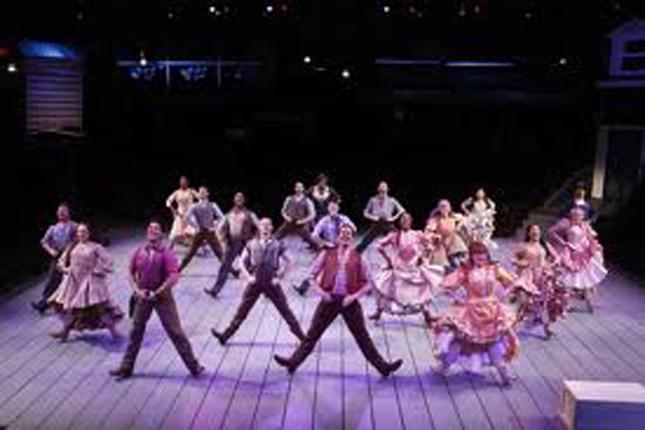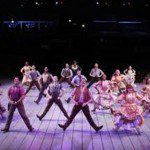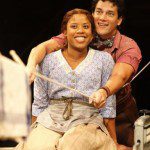Arena Stage Artistic Director Molly Smith has accomplished quite a bold and remarkable thing here, picking and staging the great, groundbreaking and revolutionary American musical “Oklahoma!” to inaugurate its first season at the Mead Center for American Theater in the Fichandler Stage.
The choice of “Oklahoma!” in the Fichandler is loaded with historical implications, and she’s managed to make something out of everyone of them. Here is “Oklahoma,” the Rodgers and Hammerstein musical, which, when it made its wartime America 1940s debut, not only signaled a spectacular career for its creators, but changed American musicals forever.
Here is Smith’s production, which preserves every word, lyric, song and piece of music, probably two-step from the original, and with intelligent use of non-traditional casting and an intimacy of space and place, makes it seem brand new, fresh, authentic and of our time. This is a production that honors this musical’s historic place in theater history while at the same time offering memories of the future.
Here is the rarely revived “Oklahoma!” staged in the Fichandler, the theater-in-the-round. Resurrected almost exactly in its original form, but surrounded by a space that makes it part of a spectacular, glass/wood/pillar encased three-theater, education and community center enterprise, as opposed to being its centerpiece. It is the historic Arena Stage intact, but also transformed in the here-and-now and the future, a more intimate theater space which seems both smaller and more vivid. But, as the fella said, the play’s the thing.
So what about this “Oklahoma!?”
Well, as the fella sings, you’re doing fine, Oklahoma, and more than okay. Likely, there are few people around today who actually saw the original production, although it’s a fair bet that there any number of people who may think they know a thing or two because of the Gordon MacRae/Shirley Jones movie, because of the sheer ingratiating quality of the music and songs which are out there in the muzak ozone.
It’s nice to come to something with no junk in your head about it. I’d never seen it and now I have, and I still feel buzzed about it. This production is such a smart operation, such an emotional bottom-well, such a high-energy all-get-out kind of thing that you’d think the whole building would levitate and turn into an active version of the spaceship it resembles.
What you’ve got, peering at close range, is Oklahoma, the territory about to become a state circa the turn of the previous century. There are cowboys, cattlemen, squatters, and a bunch of people that could resemble Adams Morgan if it were relocated into the flat, hard-won dirt and land of windy Oklahoma. There’s Curly, the cowboy smitten with the high-spirited, hard-to-get Laurey, who scrapes a living on the land she and Aunt Eller (the earthy F. Faye Butler) work along with the sinister hired hand Judd. There’s the kissable Addo Annie, torn between a cowboy and a peddler, and going back and forth between them like a ping-pong ball. And there’s Oklahoma itself, perched to become a state, awash in dry land and oil. Change is coming like a runaway train or the next election.
Here’s what else happens: the moment Curly, in the person of Nicholas Rodriguez, announces himself and the show with a burst of musical optimism in the song “Oh What a Beautiful Morning,” you’re pretty much a goner. This is theater in its most transporting, transforming guise. “Oklahoma!” swept away decades of song-strong, chorus-girl rich whimsy and pratfalls caused by gin musicals which had nothing to do with life as it was lived—not to diss Cole Porter, Gershwin and a host of other great composers and lyricists.
“Oklahoma!” is dark, especially when the sweaty, dangerous Judd is on stage, casting a murky spell of unrequited, strong desires that resembles those of modern-day stalkers and violent predators. Smith further deepens the musical and dishes on outsider themes by casting: Rodriguez as Curly is Hispanic, Butler and Eleasha Gamble (Laurey) are African American and Ali Hakim is clearly a peddler of Middle Easter origin as played here with long-suffering humor by Nehal Joshi. You might add in that the women in this story are strong enough and stronger and of a mind to do what they want, emotionally or sexually.
The dancing—those cowboys in high-booted and high-stepping array, the dream ballet—is of a part with the story and the tale they’re telling, which is nothing less than an epic of change and growth, writ both large and intimately. Those songs don’t just lay there waiting to be a YouTube offering or a the next big billboard hit. They weave into our imaginations and stories, and tell the story on stage, from the spritely “Surrey with the Fringe on Top,” to the woeful “Poor Judd is Dead,” to “I’m Just a Girl Who Can’t Say No,” the anthem-like tale of Addo Annie, played with remarkable vivaciousness by the hugely gifted and appealing June Schreiner (a junior at Madeira School, no less).
This production, so reflecting of our lives and its surroundings, is dead solid perfect entertainment, where you leave the theater like a gourmet leaving a meal that proved to be just so. I guarantee you that days later you will hum a melody, sing a fragment, remember Judd’s fierce face, Curley’s rangy voice, the bullet-sound of boots on the ground in the service of music and be glad, really glad for having been there.
- “Oklahoma!”




